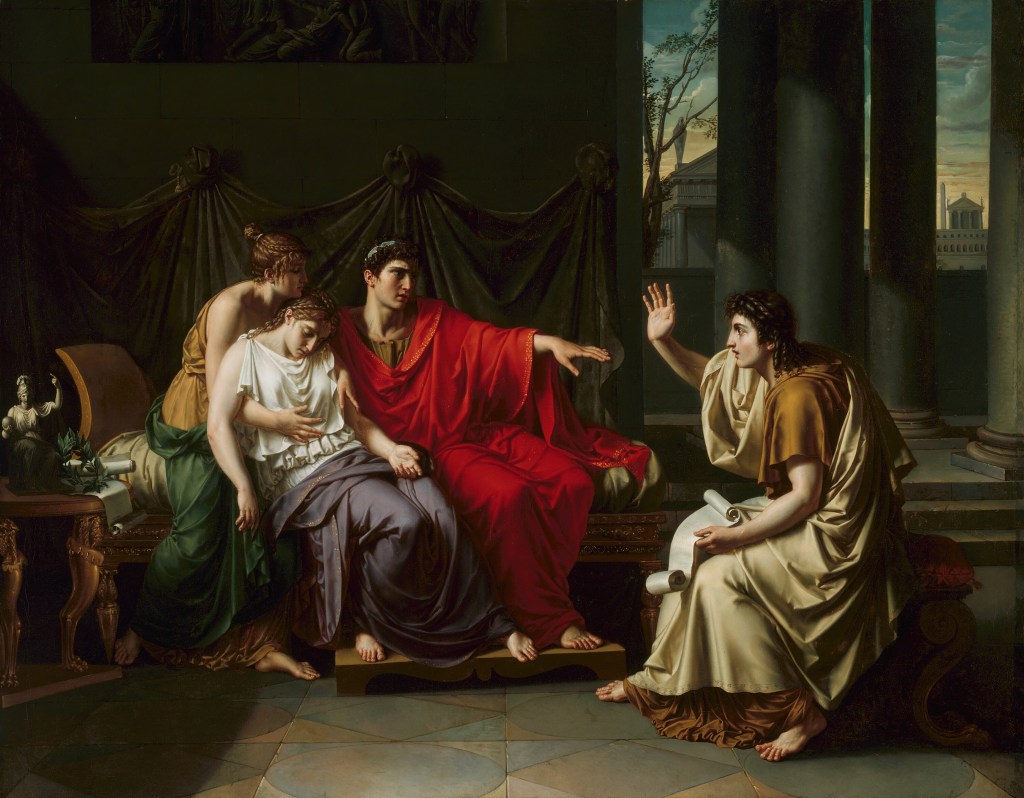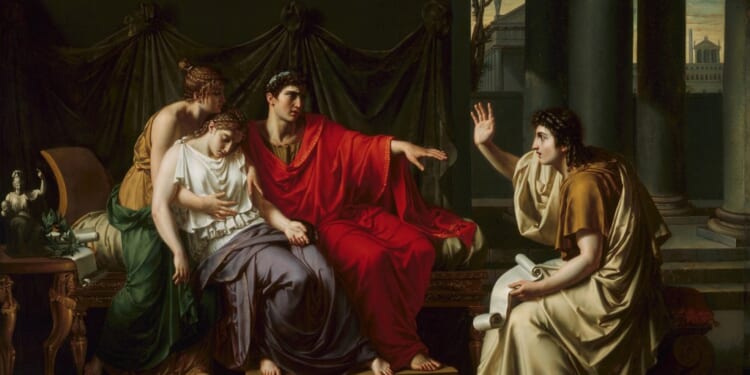
Sometime in the late 1980s, as an elementary schooler in the Soviet Union, I discovered in my family’s library a heavy, dust-laden tome. I still remember the brown-yellow-tinged paper, the thick textured cover that was beautifully embossed, and the air of age, mystery, and gravitas that enveloped the book entirely. It felt like the stuff of magic—the kind of book that you open and a fairy appears, or at least something beyond simply words on a page.
Something magical did happen, even if I did not quite recognize the extent of it at the time. Who I am today, to put it simply, is in part because of that book, a collection of Greek and Roman myths and literary texts, translated into Russian from Hungarian. Over the years that followed, I read and re-read that book so many times, I practically memorized portions. Because of that book, I sought other books of ancient myths and devoured them as well, both in Russia and subsequently in Israel, where we moved when I was almost 10. And then, when my family ended up in the U.S., right as I was starting 10th grade, ancient mythology was on my mind as I decided to start my study of Latin. Two years later, the emotional memories came flooding again as I began the study of Greek.
Over the course of the nine years that it took me to obtain my bachelor’s degree and my Ph.D. in classics, I was at last able to read in the original languages many of the literary masterpieces that I had read in adaptation or summary first as a child—and many more besides. The magic, in some ways, never faded. It only intensified—as when miraculously, in a way that still makes no real sense in any logical, worldly terms, I became a Christian at the age of 30, leaving behind the secular Judaism of my upbringing. (And all this is why I wrote the book Christians Reading Classics.)
Reading Greek was instrumental for my conversion, in hindsight—because reading the Gospels in the original Greek felt powerful in that indescribable, goosebumps-inducing way. Here was I, about as close, linguistically at least, to the texts early Christians once heard read aloud in worship. Those who could also read them for themselves in private, and some even wore these texts as amulets around the neck or carried them around as miniature codices. Reading the Gospels as a seeker and new believer took me back to the visceral memory of reading Virgil’s Aeneid—the first unadapted Latin poetry I ever read!—at age 17. At the time of that first encounter, it took hours to read a couple of verses, taking them apart, looking up what felt like every word in the dictionary, figuring out the grammatical structure and the meter, and finally understanding what the words said—literally, at least. There was a moment of sheer awe at the end, as I felt this miraculous connection to an author who lived and died more than two millennia earlier, yet whose own words I was reading now.
It was a version of this same emotion that I felt all the more powerfully 13 years later, when I was reading the Gospels in search of Christ. To add even more pathos, it was the night bridging Saturday to Sunday at the Amsterdam airport, where I was stuck on a layover overnight—knowingly and willingly. I was on my way home from an academic conference in Glasgow, and didn’t want to bother finding a hotel room for those few hours before morning. Spending a night reading the Gospels, one after another, in a silent airport, led to a conviction that the words were true, and this truth had demands upon my life. The next Sunday, I was in church for the first time.
One aspect of studying the past that has always intrigued and attracted me was perhaps not the most historical or academic of questions, but that of emotional experience. Vibes and feels get a poor rep in the academy and in the church, and with good reason. And yet, we are all feeling creatures as much as we are thinking creatures. This is an essential feature of our anthropology, the Bible acknowledges: We must love God with our hearts, minds, and souls. But what is this soul we speak of? As a classicist with a Ph.D., I love knowledge with all my mind. Yet the longer I dwell with basic knowledge of a period, the more I really want to feel how other people felt and thought, and experience the full sensory wonder of their world, millennia removed from my own. I want to understand these people who lived and died so long ago, and this takes us into the realm of something beyond the mind alone. Understanding can never be something merely cerebral. What we call the heart—or the Homeric Greeks called thumos—this all plays a role too.
I don’t overidealize the Roman Empire, to be clear. As an ethnic Jew, a woman, and a terribly nearsighted person, I surely would have fared poorly in the Roman world—not to mention the ubiquitous parasites, diseases, and deprivations to which even the most privileged persons in that world were subject. And yet, I wish to know these people more intimately in a way that verges on invasive rather than purely historical. Perhaps some of this strange desire stems from being an immigrant twice-over, a person living in a skin and mindset that feels just a little bit out of step, always thinking (not to mention speaking) with an accent. A foreigner and sojourner in a new land, I want to understand spiritual sojourners from another age.
I was reminded time and again while writing, just how spiritual the act of reading is. It is no coincidence that God reveals himself to us in a book. Books are powerful in ways we still do not fully understand, try as we might.
In my earlier days of exploring Christianity, this fascination with the power of books in my own life grew into a fascination with trying to get as close as possible to the earliest Christians’ experiences with words. I don’t just mean their reading habits, although that is certainly a part of it. I’m looking for something deeper. Even though many were illiterate, the illiterate in antiquity were surrounded by words—plays and poetry they saw performed, readings of texts in various contexts, laws and speeches in courts. Unlike the modern non-readers, an ancient illiterate urban dweller could, at least in theory, have a robust literary environment. I want to understand it in a way that transcends merely knowing what and how they read. I want to feel what they felt when they read texts; I want to weep over the same lines that brought them to tears; laugh at the same jokes.
Not long after my conversion, a retired Latin teacher at my church insisted that I read C.S. Lewis’ conversion memoir, Surprised by Joy. For Lewis too, just like for me, a childhood fascination with pagan myths led, through many twists and turns and intellectual endeavors, to a genuine adult conversion. His love of the classics never abated either, but immersed in the love of Christ, it became something new. His final project, left incomplete at the time of his death, was a verse translation of Virgil’s Aeneid. The voices of the pagan literary masters still beckoned, dazzling with their beauty. Yet, needless to say, Lewis surely read Virgil differently after his conversion than he did as an agnostic teenager. But then, this is true for the earliest Christians, who saw echoes of Christ when reading Virgil—echoes Dante saw centuries later as well, when he cast Virgil as his guide in the Divine Comedy.
Reading the New Testament in Greek somehow made this connection to the earliest converts seem possible to me from my early days of exploring Christianity. It still does, even as I realize that reading Greek in 21st century America, seated in my comfortable Midwestern living room, drinking a tea made from ingredients unknown in the old world, is all a bit of a pretentious farce. So be it. God can use even such superficial desires, misshapen though they may be, to bring us to know Him.
Perhaps what still sticks in my mind the most from those earliest readings of the New Testament as a seeker and then a new convert was that reading the Gospels in Greek made me weep uncontrollably in a way that nothing else ever could. Phrases, ideas, Jesus’ promises all stuck in my heart and soul much more than simply my mind. This was no research project—reading the Bible could never be just that. Coming from a lifetime of reading the Greco-Roman Classics, here was I, learning of a God whose answer to all the pagan gods and their worshipers was, as Augustine himself once discovered in knee-bending awe: “Come to me, all who are weary and heavy-laden, and I will give you rest.”
















